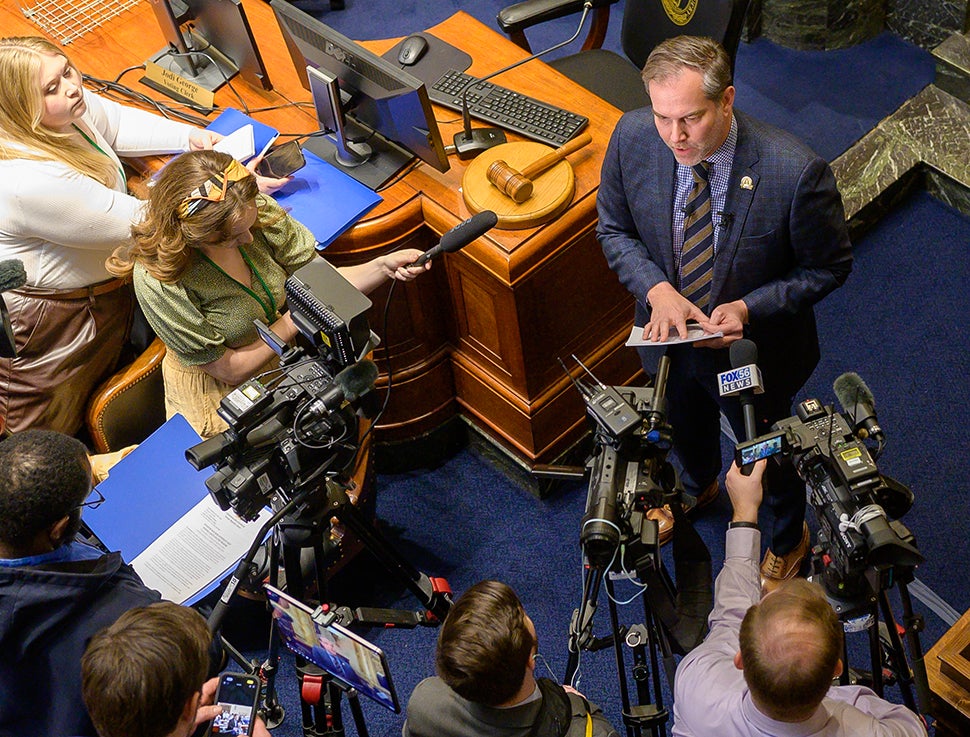‘Better than nothing:’ School safety bill gets update
Published 2:48 pm Monday, March 4, 2024

- FRANKFORT, Feb. 22 – Sen. Max Wise, R-Campbellsville, is surrounded by media Thursday as he fields questions on Senate Bill 2, legislation focused on school safety. (LRC Public Information)
FRANKFORT — In the aftermath of a 2018 school shooting in Marshall County, Sen. Max Wise sponsored and passed the School Safety and Resiliency Act to protect Kentucky students.
Five years later, the School Safety and Resiliency Act is getting an update.
The original bill was an unfunded mandate. It instructed local boards of education to hire at least one full-time school resources officer per campus.
It also set a requirement for at least one school counselor in each school, as well as a goal of at least one school-based mental health services provider for every 250 students. This requirement could be filled by certified counselors, school psychologists, school social workers or other qualified mental health professionals.
The newly established Center for School Safety was responsible for research, data analysis and information sharing about best practices for school safety.
Since its passage, 28 states have adopted some or all of the School Safety and Resiliency Act language in their own laws.
However, in recent years, some Kentucky schools have struggled to fill or fund these positions without state help.
Only 51% of schools met the goal of one mental health provider per 250 students and 57% reported having a full time SRO during the 2022-23 academic year, according to the Office of the State School Security Marshal’s annual report.
As of last month, Kentucky has nearly 800 SROs, but is lacking about 600.
After a series of meetings for last year’s Task Force on School and Campus Safety, Wise, a Campbellsville Republican, has some ideas for improvement.
“I think that this bill is a perfect blend, just like we did with Senate Bill 1 of (2019), of a mixture of both the hardening of the school infrastructure but the soft approach of the counseling and the mental health portion,” Wise said.
Senate Bill 2 is an addition to the School Safety and Resilience Act.
It allows school districts that haven’t been able to equip all school campuses with an SRO to use a “stopgap” measure in the meantime: guardians.
“The guardian is just there as a complement, an additional layer of security for the SRO,” Wise said.
“We’re not getting as many people going into law enforcement as we once had before, and that’s a tragedy. We need more people to be uniformed officers. But at the same time, if this just fills a need at the time being … I think it’s better than nothing.”
Guardians can carry weapons, but do not have arrest power like SROs. Besides that limitation, local boards would be free to determine what guardians can and can’t do, Wise said.
Discharged veterans, retired Kentucky state troopers, retired special and sworn law enforcement officers and former federal law enforcement officers are eligible to become guardians.
Before being hired, applicants must pass a background check, medical exam and polygraph test. They also must be certified by the Center for School Safety, have their concealed carry license and go through drug and psychological screenings. If they have a felony conviction or misdemeanor for sexual abuse or misconduct, they cannot be hired.
Under an updated version of the bill, guardians would be required to complete 160 hours of curriculum, including active shooter response, enhanced handgun performance and patrol rifle training.
Other SRO-based curriculum would focus on de-escalation strategies, youth mental health awareness, youth drug use and abuse, social media cyber security and diversity and bias awareness training.
“We have put a lot of safeguards in this bill, in terms of the background, the examinations, the training,” Wise said. “This is not just allowing anybody that falls under the criteria of who could be a guardian is going to be able to be a guardian.”
Local boards are not required to hire guardians. They can decide whether they are volunteer or paid positions.
SB2 also deals with mental health. It doubles the number of suicide awareness and prevention trainings per year and lowers the grade level from grades 6-12 to 4-12, based on data showing that younger kids are experiencing suicidal ideations.
It requires schools to create trauma-informed teams made up of school mental health professionals and SROs to identify and help students whose learning, behavior or relationships have been impacted by trauma.
The teams are also charged with helping other school personnel to support their trauma-impacted students and identifying ways to build resiliency and wellness in all students.
Under the bill, schools would gather data on Medicaid billing for school-based mental health services, their progress toward SRO and mental health provider goals and their trauma-informed approach plans.
The reaction to Wise’s bill has been mixed. It won committee approval from nearly everyone but Marshall County’s Sen. Danny Carroll, R-Benton, who said that the likelihood of a guardian needed to respond to a “worst-case scenario” was very minimal.
“So I think we also have to plan for what’s going to occur during the daily activities and interactions with students and fights and all those things that might occur within a day which really probably falls outside of the purview of the purpose of a guardian,” Carroll said.
“And yet they’re going to be leaned on heavily to address those issues.”
Butler County Schools Superintendent Robert Tuck said he appreciates legislators who are trying to find a creative fix for districts having difficulty finding SROs.
However, he said that he would need the sheriff’s department’s approval to participate in the guardian program, and he’s not sure if they would due to different training curriculum and protocols.
Tuck is also concerned about the data collection. While he emphasized that it’s good data to collect, he worried about more red tape potentially “bogging down some employees” who should be focusing on serving kids.
Lacretia Dye, a WKU professor who ran for office on mental health platform, said that bills like this distract from the real issues, like lax gun laws and a more digital society with less community.
“Fear captures people’s minds, and it turns us straight to this military space of like, the only way to stay safe is to have this like armed presence,” she said. “And we all know that’s not how we stay safe. We don’t stay safe with more ammunition, we stay safe with more promotion of love and peace and space.”
During a task force meeting, State School Security Marshal Ben Wilcox said that funding all school SROs would cost approximately $25 million to $50 million.
The current house budget includes nearly $35 million over the next two years on a reimbursement basis. Each district with an SRO would get up to $20,000 for each campus that has at least one full time SRO.
Tuck said his district has three SROs, but $60,000 is not enough to cover the actual $140,000 to $150,000 it spends on SROs.
He said that some legislators assumed that cities and counties were helping with part of that cost, but he doesn’t think that’s the norm.
The budget keeps the school-based mental health services provider reimbursement at the same level as the 2022 budget – $7.4 million each year.
Tuck said the district has used federal funds and billed Medicaid to hire and retain its mental health professionals. He said that having mental health professionals in schools is crucial when outside local mental health providers are at or near capacity.
“There’s some cases where if we weren’t able to provide this within the school, there’d be some students that wouldn’t be able to be provided services because there’s not a vendor out there that they can turn to,” he said.





